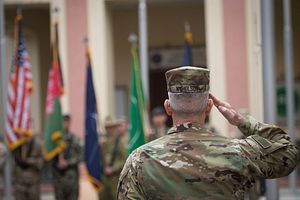Tuesday, the new commander of U.S. forces in Afghanistan, General John Nicholson, paid a high-profile visit to Kunduz. He apologized for the October airstrike on a Medecins Sans Frontieres (MSF) hospital that killed 42 people:
“As commander, I wanted to come to Kunduz personally and stand before the families, and people of Kunduz, to deeply apologize for the events which destroyed the hospital and caused the deaths of the hospital staff, patients and family members. I grieve with you for your loss and suffering; and humbly and respectfully ask for your forgiveness.”
Nicholson took over command of NATO’s Resolute Support Mission and U.S. Forces Afghanistan (USFOR-A) at the beginning of March and last week the Pentagon said it would be doling out administrative punishments to the personnel involved in the incident. Col Patrick Ryder, a spokesman for U.S. Central Command said last week “those individuals most closely associated with the incident have been suspended from their duties and were referred for administrative action.”
The strike on the MSF Kunduz hospital–which occurred amid Afghan and American efforts to push the Taliban out of Kunduz, a provincial capital in the north of the country–set off a renewed firestorm of anger directed at U.S. forces. MSF has called for an independent investigation of the airstrike and has not been satisfied with the U.S. responses.
In November, MSF General Director Christopher Stokes made a statement that “[t]he U.S. version of events… leaves MSF with more questions than answers.” Stokes’ statement was in response to Pentagon statement at the time that placed blame on the crew of the AC-130 gunship, which had fired on the hospital. The Pentagon said the hospital had been misidentified as a target and that a series of human and technical error led to the attack. At that time, the then-top U.S. Commander in Afghanistan, General John Campbell, said “Those individuals most closely associated with the incident have been suspended from their duties, pending consideration and disposition of administrative and disciplinary matters.”
The issue has risen again as the Pentagon prepares to release the unclassified version of its internal investigation. The report, which several media outlets say is due to be released soon, is unlikely to placate external observers. The report will likely be heavily redacted and blank spaces are great place for rumors to grow.
Nicholson’s apology follows those of numerous others, from the Defense Department all the way to the White House. But his visit to Kunduz nonetheless underscores a recognition, on the part of the U.S. military, that the issue at hand is greater even the the tragedy of a bombed hospital. Operational realities mean Afghan forces need the support of U.S. forces, especially with regard to airstrikes. Trust lost because of incidents like the MSF hospital attack–as well as ongoing domestic debates about how long the U.S. should stay in Afghanistan–may not be possible to regain, but American military leaders have to try. Nicholson was accompanied by his wife, Norine MacDonald, who is a security analyst, as well as acting Afghan Minister of Defense Mohammad Masoom Stanekzai and acting Afghan Minister of Interior Taj Mohammad Jahid. They met with local officials and the families of victims.
With this context in mind, Nicholson said, “You may have heard that the Taliban want to take Kunduz again – they will not… The Taliban want you to think that your government and the Coalition will abandon you — we will not. The Taliban think that by posing threats to you, the brave people of Afghanistan, that you will surrender to them – you will not.”

































